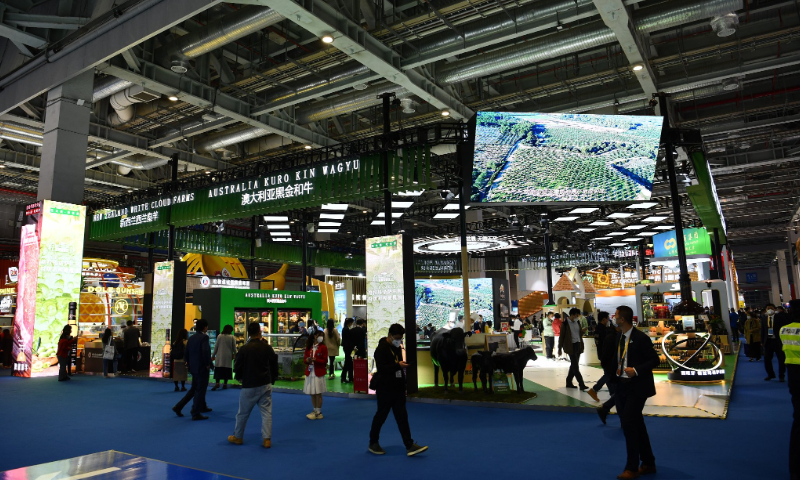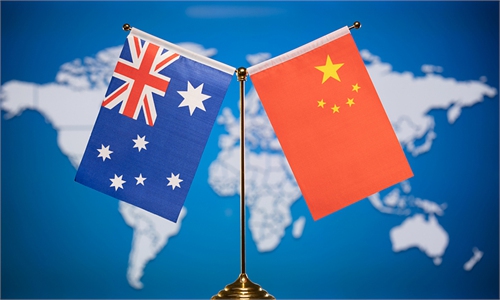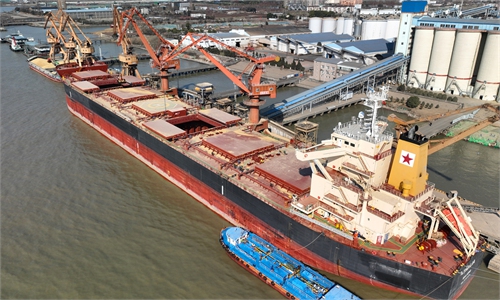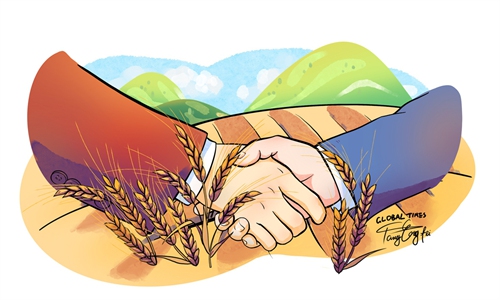
The booth of Australia Kuro Kin Wagyu at the fifth China International Import Expo on November 5, 2022. Photo: VCG
Two-way merchandise trade between China and Australia totaled $58.79 billion in the first quarter, up 10.9 percent year-on-year, data from China's General Administration of Customs (GAC) revealed on Thursday.
As bilateral economic and trade relations are improving recently, experts expressed cautious optimism over the prospects for bilateral cooperation in the months ahead and said that Canberra should show more sincerity by taking actions to improve relations and defuse potential risks for companies from both sides.
According to GAC, China's exports to Australia stood at $19.67 billion in the first three months, up 10.4 percent; while its imports from Australia totaled $39.12 billion, up 11.2 percent.
Amid the sluggish global economic recovery, such substantial growth is impressive, Song Wei, a professor at the school of international relations and diplomacy at Beijing Foreign Studies University, told the Global Times on Thursday.
It shows the high degree of complementarity between the two countries in terms of economic and industrial structures, Song said, noting that the trade exchanges showed healthy and balanced growth, which is in line with the essential interests of both countries.
The two countries recently reached a consensus on the resolution of their barley dispute under the framework of the World Trade Organization, which demonstrated the spirit of mutually beneficial cooperation, a spokesperson for China's Ministry of Commerce (MOFCOM) said on Tuesday.
China is ready to work with Australia in a spirit of dialogue, consultation and cooperation to accommodate each other's industrial concerns and resolve their economic and trade disputes, the spokesperson said.
Song is cautiously optimistic over the prospects for economic and trade exchanges.
"Some Australian officials including state governors have recently expressed their intentions to visit China. It demonstrates Australia's willingness to enhance cooperation," she added.
Victorian Premier Daniel Andrews paid a four-day visit to China in late March and Western Australia's Premier Mark McGowan reportedly will visit China on April 17. Queensland Premier Annastacia Palaszczuk is planning an official trip to China later this year as well, local media reported.
Jakob Stausholm, CEO of Anglo-Australian mining group Rio Tinto, flew to China in March and attended the China Development Forum 2023 in Beijing.
On the sidelines of the forum, he expressed high expectations for the Chinese market this year, while noting that China will again become a major contributor to global economic growth. The company has teamed up with China Baowu Steel Group to develop an iron ore mine project in Pilbara, Western Australia, which is designed to produce 25 million tons of iron ore annually, according to the company.
Local governments and companies in Australia expect that bilateral relations will develop in a sound and positive way, as it is conducive to their recovery during the post-COVID era, Song noted.
However, potential risks remain as the Australian government follows the US in terms of foreign policy and can't free itself from Washington's anti-China mindset, with the latest example of Canberra banning video-sharing app TikTok on government devices over so-called security concerns, Song noted.
It was a discriminatory restrictive measure, the MOFCOM refuted in a statement on April 7.
The move will not help safeguard Australia's national security but only undermine the international community's confidence in its business environment and harm the interests of Australian enterprises and people, the ministry said.
Though it is expected that economic and trade exchanges could see a growth this year, whether the promising prospects are sustainable for risk-sensitive businesses remains to be seen, Song said, urging the Australian government to effectively manage its domestic political divisions and stop irrationally following the US.



